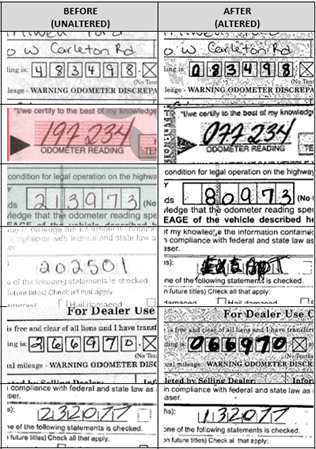Wisconsin DMV identified nearly 6,000 vehicles with odometer rollback; $37 million fraud loss last year
On National Odometer Day, the Wisconsin Department of Transportation‘s (WisDOT) Division of Motor Vehicles (DMV) reminds car buyers to verify vehicle mileage before they buy. Fraud through “odometer rollback,” changing the mileage shown on the vehicle’s odometer, is becoming more common.
Last year, investigations by Wisconsin DMV’s Dealer and Agent Section identified 5,961 vehicles which showed signs of having odometer rollbacks. This marked a sharp increase from 2023 when the DMV investigators identified 1,736 vehicles.
“Illegally manipulating odometers to roll back the mileage numbers before a sale has been around for decades. Today’s fraudsters, however, have kept pace with technology and essentially hack the vehicle’s computer to change the mileage. This puts the new owner at risk,” DMV Dealer and Agent Section Chief Maura Schifalacqua said.
Odometer rollback involves disconnecting, resetting or altering a vehicle’s odometer with the intent to change the number of miles indicated. Of the nearly 6,000 vehicles discovered with altered mileage last year, an estimated 613,910,784 miles were rolled off the odometers. The estimated fraud loss based on a $0.06 per mile damage calculation is $36,834,647.
This a marked increase from calendar year 2023, in which the identified vehicles had an estimated 181,706,452 miles rolled off the odometers, Schifalacqua noted. The estimated fraud loss in 2023 was $10,902,387.
Instances of odometer rollbacks are often caught when a vehicle is sold. Recent examples include:
· by Wisconsin wholesalers who illegally sold vehicles to retail purchasers from Wisconsin and other states
· by non-Wisconsin dealers/wholesalers to retail purchasers from Wisconsin
· by private parties to purchasers from Wisconsin
· through title processing errors
Wisconsin DMV Dealer and Agent Section investigators revoked 20 wholesale dealer licenses in 2024 due to odometer and title fraud. Last year’s total equaled the combined number of revocations from 2022 and 2023 (10 wholesale dealer licenses revoked each year).
Identifying odometer tampering
When a vehicle buyer requests a new Wisconsin title, the DMV checks the odometer statement on latest title against available title information and confirms that the information is current. Out-of-state vehicle titles are checked by using the Vehicle Information Number (VIN) in a national database. The goal is to ensure the secure creation and maintenance of vehicle records and to reduce fraud through odometer rollbacks.
Consumers can protect themselves before they take ownership of the vehicle. When purchasing a used vehicle, check these key areas to uncover possible odometer tampering:
ü The title and compare the mileage listed to the vehicle’s odometer. Look closely to ensure the mileage notation has not been obscured or altered.
ü A vehicle history report*, such as from CARFAX, and look for odometer discrepancies in the vehicle’s history.
ü Maintenance or inspection records and compare to the odometer mileage.
ü The numbers on the odometer gauge should align correctly on mechanical odometers.
ü The tires and overall condition of the vehicle. For example, if the odometer on the car shows 20,000 or less, it should have original tires. The general wear and tear of the vehicle should be consistent with the number of miles displayed on the odometer.
Vehicle titles typically have an odometer reading printed on the front of the title. Sometimes this reading has also been altered to reflect lower mileage. However, sometimes a fraudster will forget to alter this and it will still indicate a higher mileage reading.
“If the odometer statement has already been completed, look for any signs of white-out, evidence that ink has been removed, or evidence that the odometer statement has been overwritten,” Ingebrigtson said. “If the writing appears extra bold, blocky or has a zero at the front of the number, it may have been altered.”
If the title has multiple title reassignment sections completed, the seller might be an unlicensed retail dealer. Unlicensed retail dealers, which includes wholesalers selling retail and non-Wisconsin dealers selling retail within Wisconsin, are a common source of odometer fraud.
Online resources to help consumers
DMV has many online resources at wisconsindmv.gov to help consumers. Check out the DMV Consumer Rights page for additional information.
“One of the biggest regrets that I hear from odometer complainants is that they did not run a vehicle history report prior to purchasing the vehicle,” Ingebrigtson said. “Many complainants discover the odometer discrepancies on their vehicle by purchasing a vehicle history report after buying the vehicle and the vehicle starts having mechanical issues.”
Consumers may be able to file a complaint against a dealer, if there’s a problem obtaining title and/or registration, or warranty repairs. However, Wisconsin DMV is unable to help if the car was purchased from a private seller or from an out-of-state dealer.
National Odometer Day was created to raise awareness about the importance of verifying vehicle mileage to reduce consumer fraud.
NOTE: This press release was submitted to Urban Milwaukee and was not written by an Urban Milwaukee writer. While it is believed to be reliable, Urban Milwaukee does not guarantee its accuracy or completeness.
Mentioned in This Press Release
Recent Press Releases by Wisconsin Department of Transportation
Frozen Road Law Covers All Zones in Wisconsin
Feb 5th, 2026 by Wisconsin Department of TransportationLaw increases weight limits for log haulers, transport of road salt/sand






















